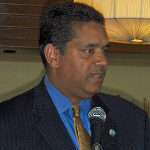
The rum controversy is just one of the subjects that deJongh will address, but it’s highest on the list, with new legislation proposed to limit the support the territory can give to the distilled spirits industry. Other topics he will discuss in meetings with House and Senate leadership include health care reform and earmarks to benefit the Virgin Islands contained in the House omnibus spending bill.
In a conference call Sunday, the governor said he will continue to explain the importance of using the rum cover over money as an economic development tool to build the rum industry in the territory and enhance and expand small businesses that rely on a major employer.
Last week Sen. Bill Nelson, D. Fla., proposed legislation to forbid any direct subsidy from any government source to the distilled spirits industry beyond an amount equal to 10 percent of the rum cover over money received by the territory. His proposal, which has not yet been submitted as a bill, would go a step further than a bill submitted earlier by Puerto Rican Commissioner Pedro R. Pierluisi that would prevent the V.I. from using more than 10 percent of the cover over funds to directly support the industry. That bill, which has not been scheduled for a hearing, would divert the Virgin Island’s cover over money to Puerto Rico if more than 10 percent is directed to the industry.
According to V.I. Congressional Delegate Donna Christensen, Nelson’s proposal would not only limit cover over subsidies to 10 percent, but would also limit any other support to the companies from any other government source above the 10 percent. She said she is not sure how or if the proposal would be submitted.
"But we have to watch it and work to ensure it doesn’t get added in," she said.
The governor said he has two concerns with the proposals, one the impact of the legislation itself, and the other the nature of the politics surrounding it.
"One of the major concerns with both bills is it begins to restrict the economic development initiative you can take," he said. "We need the ability to be able to be creative."
The other is the tactics employed by Puerto Rican interests unhappy with the steps the Virgin Islands has taken to build its rum industry.
"Every time there is an agreement or a concern, the other jurisdiction runs to Congress," he said.
While Pierluisi has said his bill, HR 2122, is not aimed specifically at the deal that brought Diageo to the Virgin Islands to make Captain Morgan’s rum, the language of the measure specifically refers to one government using cover over funds to lure a business away from another territory. DeJongh reiterated that that is not what the Virgin Islands did, and does not accurately reflect the history of the Diageo deal.
V.I. and Diageo officials have repeatedly said that before the territory ever became involved with the liquor giant, Diageo had already decided to terminate its contractual relationship with the privately owned Puerto Rican company that makes the rum which Diageo sells under its Captain Morgan label. The company was looking for a place to build its own distillery to make the rum itself, and had looked at sites outside the United States.
"We did not take Diageo from Puerto Rico," the governor said again Sunday. "We were able to have Diageo not go to a non-U.S. jurisdiction … We did not by any means recruit Diageo from Puerto Rico."
DeJongh said the agreements between the V.I. and Diageo and Cruzan rum have leveraged future revenues to create new jobs, and to help the territory through difficult economic times. Unlike Puerto Rico, the Virgin Islands has not had to lay off government employees despite economic uncertainties, reduced revenues, an inability (due to court rulings) to collect property taxes, and heavy unfunded obligations of the government retirement system.
The governor said the purpose of this week’s trip, which concludes Thursday, is to make sure lawmakers understand three key points: Diageo is not leaving Puerto Rico because it never had a facility on that island. It had a supplier relationship with a Puerto Rican company; 2) The cover over funds are not a tax on American taxpayers. They are actually paid by the company’s which produce rum, and are returned to the territories for rum sold in the United States; and 3) the amount of the rum cover over money is directly related to the success of the product – the more rum a company sells, the more that is returned to the government from which it was produced.
"That is a concept that we keep having to educate people to," deJongh said. "If we don’t realize the revenues, we don’t pay anything. … It’s very much a risk-based relationship, it’s a true public private partnership."
On health care reform, the governor said he was supporting an amendment by Sens. Robert Menendez (D, N.J.) and Chuck Schumer (D, N.Y.) that would incorporate language in the House bill expanding benefits to the territory into the Senate bill.





